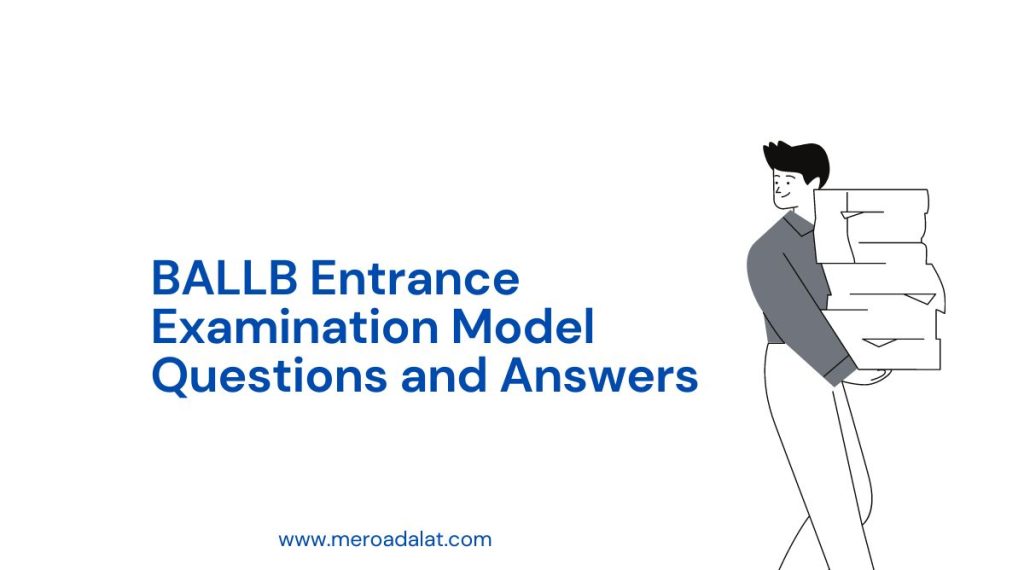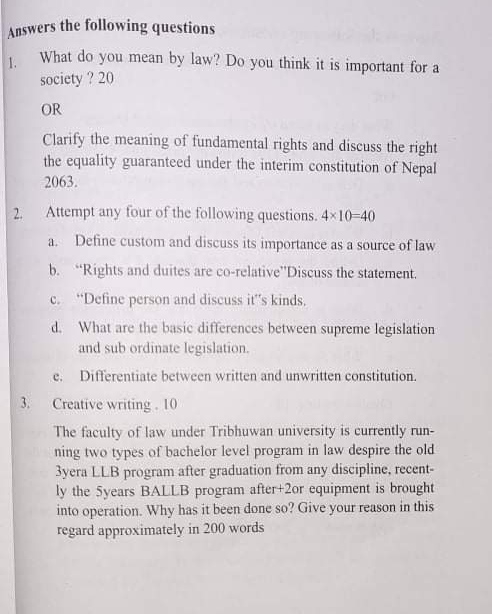Here are the BALLB entrance examination model questions and answers including subjective, objective, and creative writing.

BALLB Entrance Examination Model Questions and Answers
Objective Questions
Set 1
1. Law is derived from
- Greek
- Latin
- Roman
- French
2. Constitutional Council is headed by
- Prime Minister
- President
- Speaker of Parliament
- Chief Justice
3. Which is not a source of law?
- Legislation
- Custom
- Sanction
- Precedent
4. The term of the office of the president under the present constitution of Nepal is:
- 4 years
- 5 years
- 6 years
- 7 years
5. Who is the head of Government?
- Prime Minister
- President
- Chief Justice
- Parliament Speaker
6. Constitution is the
- Parent law
- Fundamental law
- Universal law
- Natural law
7. Substantive law creates
- Rights and Duties
- Chaos and disorder
- Morality and ethics
- Disharmony
8. The Judge made law is called
- Customary law
- Statutory law
- Precedent
- Codified law
9. Conventional law has its source in:
- Custom
- Precedent
- Legislation
- Agreement
10. The idea of ‘volkgeist’ was propounded by:
- Savigny
- Henry Maine
- Roscoe Pound
- August Comte
11. Imperative law is set by
- Divine power
- Customary practices
- Supreme power
- Judges
12. The Judicial Council is chaired by
- Chief Justice
- Speaker
- Law minister
- Attorney General
13. Which one is Private law?
- Family law
- Criminal law
- Constitutional law
- Administrative law
14. The function of the executive is to
- Implement law
- Interpret law
- to make law
- Amend law
15. Democracy Day is celebrated in Nepal in
- Falgun 7
- Chaitra 10
- Magh 7
- Baisakh 26
16. Full form of ICJ is
- International Court of Justice
- International code of Justice
- Institution Court of Justice
- International Country of Justice
17. Law is a general rule of external human action said by:
- Austin
- H.L.A Hart
- Savigny
- Holland
18. The set of rules for attaining a particular purpose like laws of health:
- Civil law
- Practical or Technical law
- Scientific law
- Natural law
19. Procedural law is also called:
- Remedy law
- Formal law
- Adjective law
- All of the above
20. T.U act is made by the legislature but T.U regulations are made by:
- Executive
- Judiciary
- Tribhuvan University
- Municipality
21. The head of the council of ministers is:
- Prime Minister
- President
- Attorney General
- Chief Justice
22. Law day is celebrated in
- Baisakh 26th
- Baisakh 27th
- Baisakh 28th
- Baisakh 29th
23. Law is
- Mandatory
- Territorial
- Clear
- All of the above
24. The law recognized by civilized nations is
- Civil law
- Criminal law
- International law
- Foreign law
25. Is foreign law international law?
- Yes
- No
- Depend upon circumstances
26. Law is the body of rules applied by the state for the administration of Justice as saying by
- Salmond
- Holland
- Austin
- Gray
27. The supreme court of Nepal consists of
- 22 judges
- 21 judges
- 20 judges
- 25 judges
28. Legislation is the
- The primary source of law
- Secondary source
- Not the source of law
29. Law is social engineering is said by
- Roscoe Pound
- Gray
- Savigny
- Salmond
30. The oath of the president is taken by
- Prime Minister
- Speaker of Parliament
- Chief Justice
- Attorney General
Answers of Set 1
1.2 2.1 3.3 4.2 5.1 6.2 7.1 8.3 9.4 10.1 11.3 12.1 13.1 14.1 15.1 16.1 17.4 18.2 19.4 20.3 21.1 22.1 23.4 24.3 25.2 26.1 27.2 28.1 29.1 30.3
Also Visit: BALLB Entrance Preparation Classes in Nepal
Set 2
1. Who issued muluki ain 2020?
- Junga Bahadur Rana
- Surya Bd Thapa
- Mahendra Shah
- Birendra Shah
2. Which organ of the state enacts the law?
- Executive
- Judiciary
- Legislative
- all of the above
3. When did Nepal get membership in the UN?
- 1954 AD
- 1955 AD
- 1990 AD
- 1995 AD
4. The Judicial Council is headed by
- Prime Minister
- Chief Justice
- President
- Speaker
5. Law made by the executive is called
- Rules
- Act
- Precedent
- Custom
6. When was Nepal Law Campus established?
- 2010 BS
- 2011 BS
- 2012 BS
- 2013 BS
7. Nepal Law Campus launched B.A.LLB course in:
- 2007 AD
- 2008 AD
- 2009 AD
- 2010 AD
8. When was Nepal Bar Association established?
- 2013 BS
- 2015 BS
- 2018 BS
- 2020 BS
9. When was the Supreme Court of Nepal established?
- 2010 BS
- 2011 BS
- 2013 BS
- 2015 BS
10. What is the full form of VAT?
- Value Added tax
- Value Acquired Tax
- Value Advance Transfer
- None of the above
11. Who is the head of the council of ministers in Nepal?
- Prime minister
- Finance Minister
- President
- Educational Minister
12. Law made by my legislature parliament is called:
- Judicial decision
- Legislation
- Custom
- Rules
13. International Human Rights Day is celebrated on:
- May,1
- March,8
- June,20
- December,10
14. The constitutional council is headed by:
- The prime minister
- The chairperson of the Constituent Assembly
- The Chief Justice
- The President
15. Nepal is:
- Federal Democratic Republic State
- Monarchial State
- Unitary State
- Religious State
16. Which is the shortest day of the year?
- June 22
- July 22
- December 22
- November 22
17. Which constitutional organ of Nepal is working to control corruption?
- CIAA
- NHRC
- Auditor General
- Attorney General
18. What is the minimum age requirement for a candidate to be a member of parliament?
- 21 yrs
- 25 yrs
- 35 yrs
- 32 yrs
19. Which of the following fundamental right is guaranteed in Article 20?
- Right to justice
- Right to Property
- Right of Women
- Right of the child
20. Who gives the interpretation of the constitution?
- Executive
- Attorney General
- Judiciary
- Lawyer
21. Executive organ of the state refers to:
- Legislature
- Government
- Judiciary
- Parliament
22. Example of supreme legislation is
- Parliament
- Government
- Supreme court
- Judges
23. The concept of law is written by
- Salmond
- Gray
- HLA Hart
- Blackstone
24. Right to Property is in the article
- 25
- 26
- 27
- 28
25. Right to information is in the article
- 26
- 27
- 28
- 29
26. Right of Children is in the article
- 37
- 38
- 39
- 40
27. The number of house of representatives in the parliament of Nepal is:
- a. 270
- b.275
- c.280
- d.59
28. The no. of national assembly members is
- 59
- 60
- 61
- 65
29. Among the total national assembly members, 3 are nominated by
- PM
- Chief Justice
- President
- Speaker of Parliament
30. When is Loktantra day celebrated?
- Baisakh 11
- Baisakh 12
- Jestha 11
- Jestha 14
Answers of Set 2
1.3 2.3 3.2 4.2 5.1 6.2 7.4 8.1 9.3 10.1 11.1 12.2 13.4 14.1 15.1 16.3 17.1 18.2 19.1 20.3 21.2 22.1 23.3 24.1 25.2 26.3 27.2 28.1 29.3 30.1
Set 3
1) Law made by Government is called:
- Rules
- Custom
- Acts
- Precedent
2) General observations made by Judges during the course of Judgment are known as:
- Obiter dicta
- Ratio Decidendi
- Precedent
- None
3) “Laws are the creation of climate and local situation” is an assumption by:
- Historical School
- Natural school
- Analytical School
- Sociological school
4) Precedent is considered an important source of law on the basis of?
- Principle of Natural Justice
- Obiter Dictum
- Analytical School
- Ratio Decidendi
5)…….is the Source of law that arises from the immemorial usage of the Community.
- Ordinance
- Custom
- Legislation
- Precedent
6. Commodity exchange theory of the socialist school is propounded by?
- Pashukanis
- Hegel
- Lenin
- Karl Marx
7) Principle of Stare Decisis refers to:
- Reason for the Decision
- Let the decision stand
- Observations made by Judges
- None of above
8) Authority of the Precedent can be overturned.
- Prime Minister
- Chief Justice
- Act of Parliament
- President
9)Law processed from other bodies than sovereign power is:
- Supreme Legislation
- Direct Legislation
- Sub Ordinate Legislation
- None
10) Which school of law is also known as functional jurisprudence?
- Sociological Law School
- socialist school
- Special Law
- public law
11) The doctrine of precedent laws derived their legality stems from:
- England
- France
- America
- India
12)……..is the principle of law formulated by the judge for the purpose of deciding the case.
- Stare Decisis
- Ratio Decidendi
- Obiter dicta
- None
13) Which article of the Constitution has made provision for the principle of stare
decisis?
- 133
- 144
- 126
- 128
14) Which delegated legislation is not found in existence:
- Executive Legislation
- Municipal Legislation
- Colonial Legislation
- Autonomous Legislation
15) Which is the oldest source of law?
- Custom
- Precedent
- Legislation
- All
16) Law is the means for affecting social control and did not believe in the abstract or mechanical application of the law” is an assumption of:
- Sociological School
- Realist school
- Natural School
- Analytical school
17) Which school presupposes that law is intimately connected with society and since society changes faster than law, there can never be certain about the law?
- Realist School
- imperative school
- Historical School
- socialist school
18) Which article of the constitution of Nepal provides that law declared by
supreme courts shall be binding on all courts within the territory of
Nepal?
- 126(1)
- 126(3)
- 128(3)
- 128(4)
19) Decision of the Foreign Court is:
- Binding Source of Law
- Historical source of law
- Persuasive
- Both b &c
20) Law develops like a language:
- Socialist school
- Realist School
- Historical School
- Sociological School
21) Law is the command of the sovereign backed by sanction:
- Realist School
- Sociological School
- Analytical School
- Socialist school
22) Which of the following country have the shortest constitution in the world?
- Chile
- Nepal
- USA
- India
23)Founder of socialist school:
- Karl Marx
- Karl Llewellyn
- John Rawls
- Holmes
24) “Withering away of State” is the concept of:
- Socialist School
- Analytical school
- Sociological School d
- Historical school
25) Article 128 of the constitution of Nepal is related to
- Supreme Court
- High Court
- Jurisdiction
- District Court
26) Sociological School is also called
- Functional Jurisprudence
- Bracket theory
- Real Jurisprudence
- Concession theory
27) “Law is nothing but a set of facts is preached by:
- Olivercrona
- Maine
- Trotsky
- Maine
28) Leviathan book is written by
- Marx
- Austin
- Salmond
- Hobbes
29) “Social utilitarianism” theory is propounded by?
- Austin
- Kelson
- Ihering
- Pound
30. Who declares a state of emergency in respect of the state of Nepal?
- Prime Minister
- Speaker of House
- The federal Parliament
- President
Answers of set 3
1.1 2.1 3.1 4.4 6.1 7.2 8.3 9.3 10.1 11.1 12.2 13.4 14.3 15.1 16.1 17.2 18.4 19.3 20.3 21.3 22.3 23.1 24.1 25.3 26.1 27.1 28.4 29.2 30.4
Subjective Questions
Set 1
- How do you define law? Why is law essential for society?[20]
OR
What are the Fundamental rights guaranteed by the existing constitution of Nepal?
2. Attempt any three of the following question: [3×10=30]
- Explain legislation as a source of law. Also, give your valid reason why it is regarded as one of the important sources of law in municipal law.
- Differentiate between a Natural person and a legal person? Differentiate between Parliamentary and Presidential Constitution.
- Are Rights and duties Co-related to each other? Explain.
- Write down the salient features of the new constitution (2072).
3. Creative writing
How is the Independence of the Judiciary implemented in Nepal? Explain focusing on the present context. (20)
Set 2

For official information regarding law, visit Faculty of Law
For BALLB Entrance Syllabus, visit: BALLB Entrance Syllabus
